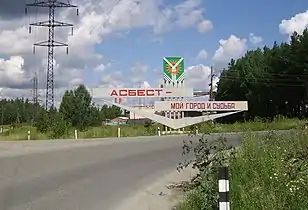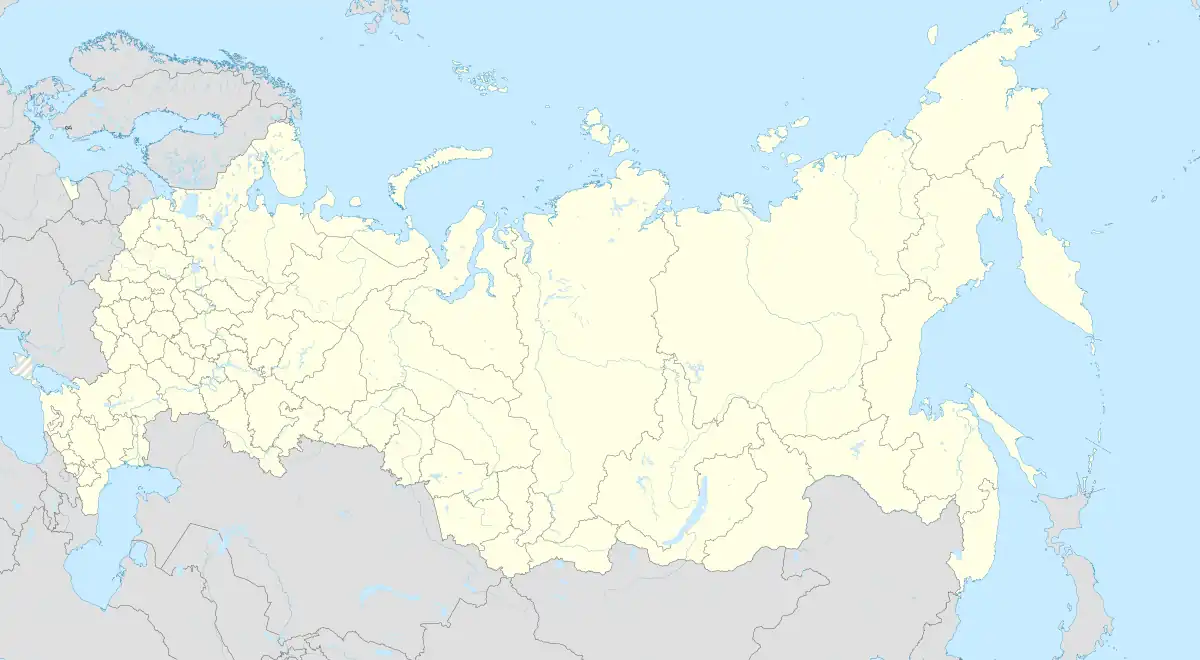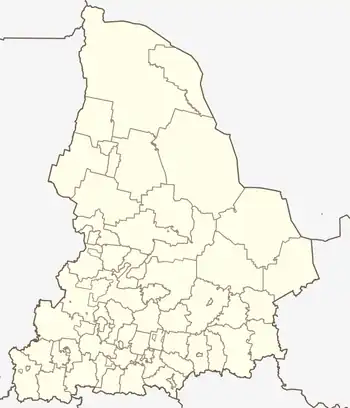Asbest
Asbest (Russian: Асбе́ст) is a town in Sverdlovsk Oblast, Russia, located on the Bolshoy Reft River (right tributary of the Pyshma) on the eastern slopes of the Ural Mountains, 70 kilometers (43 mi) northeast of Yekaterinburg. Population: 68,893 (2010 Census);[2] 76,328 (2002 Census);[7] 84,470 (1989 Census).[8] It was previously known as Kudelka (Sliver) (until 1928).
Asbest
Асбест | |
|---|---|
 Welcome sign at the entrance to Asbest, saying "Asbest is my town and destiny" | |
.png.webp) Flag .png.webp) Coat of arms | |
Location of Asbest | |
 Asbest Location of Asbest  Asbest Asbest (Sverdlovsk Oblast) | |
| Coordinates: 57°00′N 61°28′E | |
| Country | Russia |
| Federal subject | Sverdlovsk Oblast[1] |
| Founded | 1889 |
| Town status since | 1933 |
| Elevation | 220 m (720 ft) |
| Population | |
| • Total | 68,893 |
| • Estimate (2018)[3] | 64,091 (−7%) |
| • Subordinated to | Town of Asbest[1] |
| • Capital of | Town of Asbest |
| • Urban okrug | Asbestovsky Urban Okrug[4] |
| • Capital of | Asbestovsky Urban Okrug[4] |
| Time zone | UTC+5 (MSK+2 |
| Postal code(s)[6] | 624260 |
| Dialing code(s) | +7 34365 |
| OKTMO ID | 65730000001 |
Etymology
The town is named for its asbestos industry.
History
It was founded in 1889 as Kudelka (Куделька).[9] It was given its present name in 1928 and granted town status in 1933.
Administrative and municipal status
Within the framework of the administrative divisions, it is, together with the work settlements of Malysheva and Reftinsky and five rural localities, incorporated as the Town of Asbest[1]—an administrative unit with the status equal to that of the districts.[10]
As a municipal division, Asbest and two rural localities are incorporated as Asbestovsky Urban Okrug.[4] The urban-type settlement of Malysheva, together with three other rural localities, is incorporated separately as Malyshevsky Urban Okrug, and the urban-type settlement of Reftinsky is incorporated separately as Reftinsky Urban Okrug.[4]
Economy
Today's Asbest is a large industrial center. Joint-stock company Uralasbest is the main industrial enterprise. The chrysotile (asbestos) mine adjacent to the town is the subject of published, peer-reviewed scientific investigations about its detrimental health impact on the local population, and is said to be the world's largest.[11] The adjacent open-pit Uralasbest mine is said to be "seven miles (11 km) long and 1 to 1.5 miles (2.5 km) wide, (and) it is nearly half the size of Manhattan — and more than a thousand feet (300 meters) deep".[12]
Other factories include UralATI, Zarechny, Asbostroy, Asbestovskaya poultry processing plant, and a ferroconcrete production factory. Asbestos, bricks, porcelain, furniture, metal constructions, and other products are produced in Asbest.
Education and recreation
The town is home to the Uralasbest stadium, which seats ten thousand people. Educational facilities include music schools, a school of art, an Olympic school, an institute of science and research, professional schools, and colleges of mining and economics. There are two museums: a geological museum and a museum of local lore.
History
Walter Arnold Rukeyser, an electrical engineer with extensive experience with asbestos in Quebec, worked in Asbest in 1929, and again in 1930. His memoir of his times there, "Working for the Soviets ; an American engineer in Russia," was published in 1932 and reprinted in 1952.
Following World War II, the Soviet Union operated the prisoner-of-war camps 84 and 314 near Asbest. In addition, from May 1950 until April 1953, up to 7700 inmates were imprisoned in the Bazhenovsky ITL gulag. Inmates had to work for the local asbestos industry; more than 15,000 died due to the conditions, including asbestos-related diseases and lack of clean water.
References
Notes
- Государственный комитет Российской Федерации по статистике. Комитет Российской Федерации по стандартизации, метрологии и сертификации. №ОК 019-95 1 января 1997 г. «Общероссийский классификатор объектов административно-территориального деления. Код 65 409», в ред. изменения №278/2015 от 1 января 2016 г.. (State Statistics Committee of the Russian Federation. Committee of the Russian Federation on Standardization, Metrology, and Certification. #OK 019-95 January 1, 1997 Russian Classification of Objects of Administrative Division (OKATO). Code 65 409, as amended by the Amendment #278/2015 of January 1, 2016. ).
- Russian Federal State Statistics Service (2011). Всероссийская перепись населения 2010 года. Том 1 [2010 All-Russian Population Census, vol. 1]. Всероссийская перепись населения 2010 года [2010 All-Russia Population Census] (in Russian). Federal State Statistics Service.
- "26. Численность постоянного населения Российской Федерации по муниципальным образованиям на 1 января 2018 года". Federal State Statistics Service. Retrieved January 23, 2019.
- Law #85-OZ
- "Об исчислении времени". Официальный интернет-портал правовой информации (in Russian). June 3, 2011. Retrieved January 19, 2019.
- Почта России. Информационно-вычислительный центр ОАСУ РПО. (Russian Post). Поиск объектов почтовой связи (Postal Objects Search) (in Russian)
- Russian Federal State Statistics Service (May 21, 2004). Численность населения России, субъектов Российской Федерации в составе федеральных округов, районов, городских поселений, сельских населённых пунктов – районных центров и сельских населённых пунктов с населением 3 тысячи и более человек [Population of Russia, Its Federal Districts, Federal Subjects, Districts, Urban Localities, Rural Localities—Administrative Centers, and Rural Localities with Population of Over 3,000] (XLS). Всероссийская перепись населения 2002 года [All-Russia Population Census of 2002] (in Russian).
- Всесоюзная перепись населения 1989 г. Численность наличного населения союзных и автономных республик, автономных областей и округов, краёв, областей, районов, городских поселений и сёл-райцентров [All Union Population Census of 1989: Present Population of Union and Autonomous Republics, Autonomous Oblasts and Okrugs, Krais, Oblasts, Districts, Urban Settlements, and Villages Serving as District Administrative Centers]. Всесоюзная перепись населения 1989 года [All-Union Population Census of 1989] (in Russian). Институт демографии Национального исследовательского университета: Высшая школа экономики [Institute of Demography at the National Research University: Higher School of Economics]. 1989 – via Demoscope Weekly.
- Kopyrin, Alexander Leonidovich (2012). Асбест. Куделька. Копи. Asbest. ISBN 978-5-9903980-1-6.
{{cite book}}: CS1 maint: location missing publisher (link) - Law #30-OZ
- Tossavainen, Antti; Kovalevsky, Evgeny; Vanhala, Esa; Vanhala, Timo; Tuomi, Timo (2000). "Pulmonary mineral fibers after occupational and environmental exposure to asbestos in the Russian chrysotile industry". American Journal of Industrial Medicine. 37 (4): 327–333. doi:10.1002/(SICI)1097-0274(200004)37:4<327::AID-AJIM1>3.0.CO;2-1. PMID 10706743.
- Shleynov, Roman (July 20, 2010). "The World's Asbestos Behemoth". The Center for Public Integrity.
{{cite web}}: Missing or empty|url=(help)
Sources
- Областная Дума Законодательного Собрания Свердловской области. Областной закон №30-ОЗ от 20 мая 1997 г. «Об административно-территориальном устройстве Свердловской области», в ред. Закона №32-ОЗ от 25 апреля 2012 г. «О внесении изменений в Областной закон "Об административно-территориальном устройстве Свердловской области"». Вступил в силу со дня официального опубликования за исключением отдельных положений, вступающих в силу в иные сроки. Опубликован: "Областная газета", №81, 3 июня 1997 г. (Oblast Duma of the Legislative Assembly of Sverdlovsk Oblast. Oblast Law #30-OZ of May 20, 1997 On the Administrative-Territorial Structure of Sverdlovsk Oblast, as amended by the Law #32-OZ of April 25, 2012 On Amending the Oblast Law "On the Administrative-Territorial Structure of Sverdlovsk Oblast". Effective as of the day of the official publication with the exception of several clauses which take effect on a different date.).
- Областная Дума Законодательного Собрания Свердловской области. Закон №85-ОЗ от 12 июля 2007 г. «О границах муниципальных образований, расположенных на территории Свердловской области», в ред. Закона №107-ОЗ от 29 октября 2013 г. «Об упразднении отдельных населённых пунктов, расположенных на территории города Ивделя, и о внесении изменений в Приложение 39 к Закону Свердловской области "О границах муниципальных образований, расположенных на территории Свердловской области"». Вступил в силу через 10 дней после официального опубликования. Опубликован: "Областная газета", №232–249, 17 июля 2007 г. (Oblast Duma of the Legislative Assembly of Sverdlovsk Oblast. Law #85-OZ of July 12, 2007 On the Borders of the Municipal Formations on the Territory of Sverdlovsk Oblast, as amended by the Law #107-OZ of October 29, 2013 On Abolishing Several Inhabited Localities on the Territory of the Town of Ivdul and on Amending the Law of Sverdlovsk Oblast "On the Borders of the Municipal Formations on the Territory of Sverdlovsk Oblast". Effective as of the day which is 10 days after the official publication.).
- Kopyrin, Alexander Leonidovich (2012): Асбест. Куделька. Копи. ISBN 978-5-9903980-1-6
External links
- Official website of Asbest (in Russian)
- Directory of organizations in Asbest (in Russian)